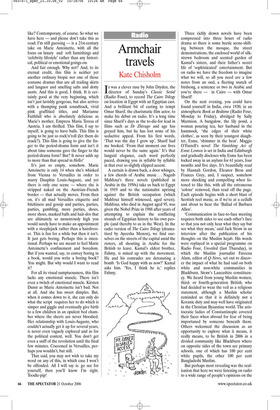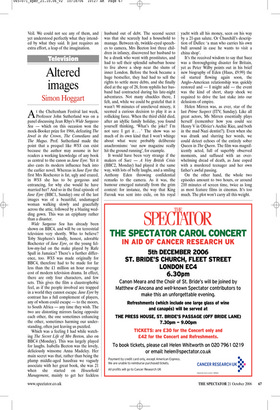Armchair travels
Kate Chisholm
It was a clever ruse by John Dryden, the director of Sunday’s Classic Serial (Radio Four), to record The Cairo Trilogy on location in Egypt with an Egyptian cast. And a brilliant bit of casting to tempt Omar Sharif, the charismatic film actor, to make his début on radio. It’s a long time since Sharif’s days as the to-die-for lead in films such as Dr Zhivago and age has greyed him, but he has lost none of his seductive appeal. From his first words, ‘That was the day I grew up’, Sharif had me hooked. ‘From that moment our lives would never be the same again.’ It’s that languid elegance, each word perfectly paced, drawing you in syllable by syllable in that ever so slightly clipped accent.
A curtain is drawn back, a door whinges, a few chords of Arabic music ... Naguib Mahfouz’s three novels (published in Arabic in the 1950s) take us back to Egypt in 1919 and to the nationalist uprising against the British occupation (which Mahfouz himself witnessed, aged seven). Mahfouz, who died in August aged 95, was given the Nobel Prize in 1988 after years of attempting to explain the conflicting strands of Egyptian history to his own people (and thereby to us in the West). In the radio version of The Cairo Trilogy (dramatised by Ayeesha Menon), we find ourselves on the streets of the capital amid the rioters, all shouting in Arabic for the British to leave. Kamal’s eldest brother, Fahmy, is mixed up with the movement. He and his comrades are detonating a bomb. ‘Is God happy with us now?’ Kamal asks him. ‘Yes, I think he is,’ replies Fahmy. Three richly drawn novels have been compressed into three hours of radio drama so there is some hectic scene-shifting between the mosque, the street demonstrations, the enclosed world of silkstrewn bedroom and scented garden of Kamal’s sisters, and their father’s secret life of ‘sophisticated’ entertainment. But on radio we have the freedom to imagine what we will, so all you need are a few notes from an oud, a fleeting snatch of birdsong, a sentence or two in Arabic and you’re there — in Cairo — with Omar Sharif!
On the next evening, you could have found yourself in India, circa 1930, in an atmospheric Book at Bedtime (Radio Four, Monday to Friday), abridged by Sally Marmion. A bungalow, the lily pond, a woman pouring tea, her husband in the hammock, ‘the edges of their white clothes’, as seen by their youngest daughter, Esme, ‘shimmer in the heat’. Maggie O’Farrell’s novel The Vanishing Act of Esme Lennox is set in India and Edinburgh and gradually discloses why Esme has been locked away in an asylum for 61 years, four months and five days. It’s beautifully read by Hannah Gordon, Eleanor Bron and Frances Grey, and, I suspect, somehow more shocking and compelling when listened to like this, with all the extraneous ‘colour’ removed, than read off the page. Each episode begins with a short blast of Scottish reel music, as if we’re at a ceilidh and about to hear the ‘Ballad of Barbara Allen’.
‘Communication in face-to-face meeting requires both sides to see each other’s face so that you not only hear what they say but see what they mean,’ said Jack Straw in an interview after the publication of his thoughts on the Muslim hejab. His words were replayed in a special programme on Radio Four, Unveiled (last Thursday), in which the Muslim journalist Fareena Alam, editor of Q-News, set out to discover the impact of what he had said on both white and non-white communities in Blackburn, Straw’s Lancashire constituency. We heard from young Muslim women, thirdor fourth-generation British, who had decided to wear the veil as a religious statement, although a Muslim scholar reminded us that it is definitely not a Koranic duty and may well have originated in the Christian Byzantine world. The aristocratic ladies of Constantinople covered their faces when abroad for fear of being importuned by someone beneath them. Others welcomed the discussion as an opportunity to explore what it means, it really means, to be British in 2006 in a divided community like Blackburn where on opposite sides of the town are primary schools, one of which has 100 per cent white pupils, the other 100 per cent Bangladeshi Muslim.
But perhaps most revealing was the realisation that here we were listening on radio to a wide range of people’s opinions on the Veil. We could not see any of them, and yet understood perfectly what they intended by what they said. It just requires an extra effort, a leap of the imagination.



































































































 Previous page
Previous page